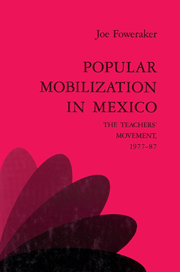Book contents
- Frontmatter
- Contents
- Preface
- Glossary of acronyms
- Introduction: The character and context of popular mobilization in contemporary Mexico
- PART I POPULAR MOVEMENT AND SYNDICAL STRUGGLE
- 1 Teachers as political actors
- 2 The original impetus
- 3 The institutional terrain
- PART II INSIDE THE MOVEMENT IN CHIAPAS
- PART III NATIONAL MOBILIZATION AND SYSTEM RESPONSES
- PART IV POPULAR MOVEMENTS AND POLITICAL CHANGE
- Bibliography
- Index
1 - Teachers as political actors
Published online by Cambridge University Press: 29 September 2009
- Frontmatter
- Contents
- Preface
- Glossary of acronyms
- Introduction: The character and context of popular mobilization in contemporary Mexico
- PART I POPULAR MOVEMENT AND SYNDICAL STRUGGLE
- 1 Teachers as political actors
- 2 The original impetus
- 3 The institutional terrain
- PART II INSIDE THE MOVEMENT IN CHIAPAS
- PART III NATIONAL MOBILIZATION AND SYSTEM RESPONSES
- PART IV POPULAR MOVEMENTS AND POLITICAL CHANGE
- Bibliography
- Index
Summary
The place: community and caciquismo
The teachers of Mexico are the natural leaders of the community. They are the intellectuals of the poor. In the countryside they work to organize peasant societies that are increasingly disperse and demoralized, and in the cities they are paid minimum wages to make schools for the dispossessed (Salinas Alvarez 1983). No matter that in recent years the teachers have come to see themselves as workers first and teachers second. Their work is distinctly cultural, serving both the material and the spiritual needs of the nation. The special nature of their work, which in Mexico is both cultural and communal, makes the teachers different from all other workers in the service sector or in state employ. The promise of the Revolution was universal education, and the legacy is a special relationship between teachers and people. In Mexico, the teachers' struggle is necessarily and instrinsically a popular struggle.
This social intimacy between teachers and people does not mean that teachers are in some way morally superior, even if the educational projects of the past may have sought to make them so. The language of Vasconcelos described a missionary of civilization, and that of Cárdenas described an apostle of socialism (Raby 1974). But equally the teachers have often sought solace for their frustrations in the demon drink or have failed to bear the harsh confines of rural life for more than two or three days a week. In modern times, the traditional role has been threatened by the increasing misery of the countryside and the material attractions of a career in the city, and every teacher is now assumed to seek city life.
- Type
- Chapter
- Information
- Popular Mobilization in MexicoThe Teachers' Movement 1977–87, pp. 19 - 31Publisher: Cambridge University PressPrint publication year: 1993

